Due to personal reasons, I am incapable of talking about pain without humor. It’s a defense mechanism, I admit—when you’re dealing with it a lot (chronic pain is a thing I’ve been accustomed to for the majority of my life), sometimes it’s easier to make light of it. But the other day I realized something about how I apply this lens to fiction: Many of the characters I adore have their own issues with chronic pain, and this specific difficulty is tied to how much I care for them. My baby, I think to myself. No one should ever be cruel to this sweet glazed doughnut. Don’t you touch their aching heads.
Here is a list of people who have Been Through Enough Hurting. Kindly leave them alone, for my sake.
Frodo Baggins—The Lord of the Rings by J.R.R. Tolkien
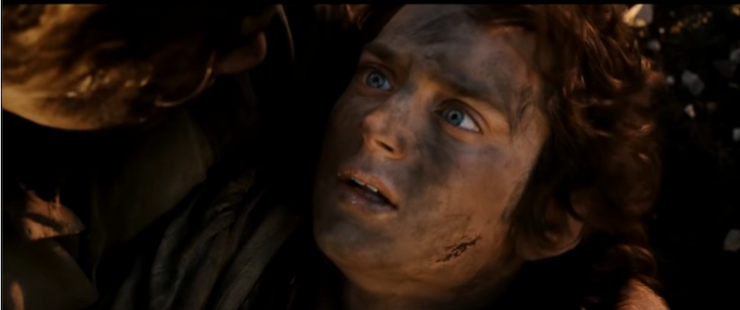
I used to have regular fights in high school with misguided souls who had watched the Lord of the Rings films, and somehow thought they were cool for insisting that Frodo should not have been the Ring-bearer. “He’s weak,” they’d say. “Aragorn could have taken the Ring.” This despite the fact that the narrative, on film and in print, goes out of its way to address the fact that, no, Aragorn can’t carry the Ring, no one can carry the Ring except Frodo (and briefly Sam) to its needed destination. That is literally The Point of the story. We should not need to have this conversation.
The films may not linger as much on this point, but my extreme sympathy for Frodo stemmed from the fact that he was constantly in pain in order to carry out his heroic task. Whether it was physical hurting or psychic hurting or devastating fatigue, the fact that Frodo makes it to Mount Doom is a testament to his his incredible strength of character (and Sam’s as well, of course). Even after doing his good deed, he still has to contend with the echoes of all that strain on his body—he loses a finger and has a magical stab wound that frequently acts up when he’s trying to go about his hobbit business. Point is, don’t you dare claim Frodo was second best. He is good and he is tired, and you should be nice to him.
Laura Roslin—Battlestar Galactica
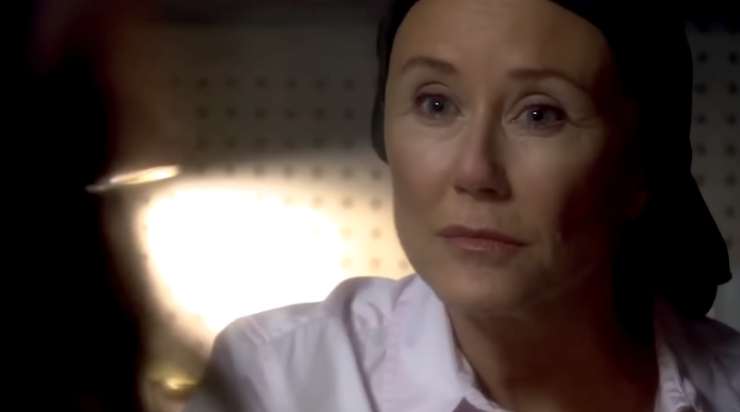
Bad enough being in charge of the fate of all humanity—being responsible for keeping humanity going after a genocidal event probably isn’t high on anyone’s list of dream jobs—Laura Roslin has to balance this job with constant stays in sick bay. She receives a breast cancer diagnosis right before the Cylon attack on the Twelve Colonies, precipitating her ascendancy to the Presidency. Following that, she has to manage her condition and the responsibilities of that job to the best of her ability. For a time, she appears to have beaten the cancer, but when it returns her condition is actually used against her in the trial of Gaius Baltar.
Laura Roslin spends practically her entire tenure as leader of humankind going back and forth between various treatments for her cancer, some of which are drugs with hallucinogenic side effects that give her very special visions of a prophetic sort. And to compound this already untenable lot, she falls in love with Admiral Adama, knowing that she is unlikely to survive and build a life with him on the other side of their journey. In the parlance of our times, your fave could never. Questionable choices aside, Laura Roslin has my unyielding affection and awe.
Spock—Star Trek
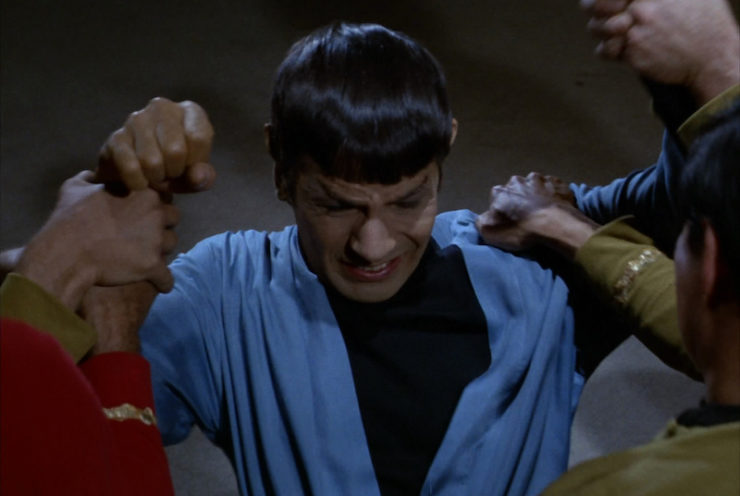
As a character, Spock deals with a lot of emotional pain due to difficulties reconciling his human and Vulcan heritages. He’s also one of Trek’s primary punching bags, injured often for the sake of making the audience feel bad. Then someone has to worry over him (usually Kirk, McCoy, or some combination of the two), and we all live vicariously. This precious pointy boy. It’s difficult having emotions and also getting flung to and fro by strange aliens with mind powers.
But perhaps the most relatable aspect of Spock’s damsel status is the fact that he’s always desperate to get back to his station and do his job, no matter how much everything hurts. We see it in several episodes, including “Operation: Annihilate!” where Spock is infected by an alien that fixes itself to his nervous system and keeps him in agony. At one point, McCoy tells Kirk that according to his instruments, Spock is in so much pain that he shouldn’t even be conscious, but Spock is still trying to drag himself to the bridge and do Starfleet stuff. Big mood, Spock. Big. Mood.
Wolverine—X-Men
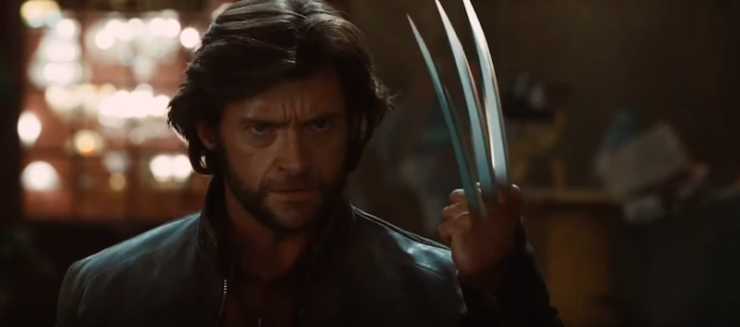
I never really cared much about Wolverine, even as a kid from the generation that grew up on X-Men: The Animated Series. He’s just kinda grumpy and funny and there to cause problems. Then the first X-Men film came out in 2000 and Hugh Jackman gruffly informed Anna Paquin that the claws hurt when they shoot out from his knuckles “every time” and my whole view of the character shifted. Why would you do that to me? He’s just there to smoke cigars and talk about Canada every once in a while. He’s supposed to pine after Jean because he has no life, and then vanish from sight.
But that scene permanently reframed Wolverine as a character whose mutant “powers” are also a source of constant pain. And then you have to think about it every time he extends those adamantium claws. There they are—ouch. And again—double ouch. Do they keep hurting while they’re out? Does the ache only cease when they retract into his arm bones? Does the repeat trauma of slicing through muscle and skin to emerge outside his body ever make him reluctant to use them? I feel like even with those fancy healing powers, I’d develop an extreme aversion to unleashing my slashy friends. Sheesh, Logan. Have another cheap whiskey on me.
Scorpius and Pilot—Farscape
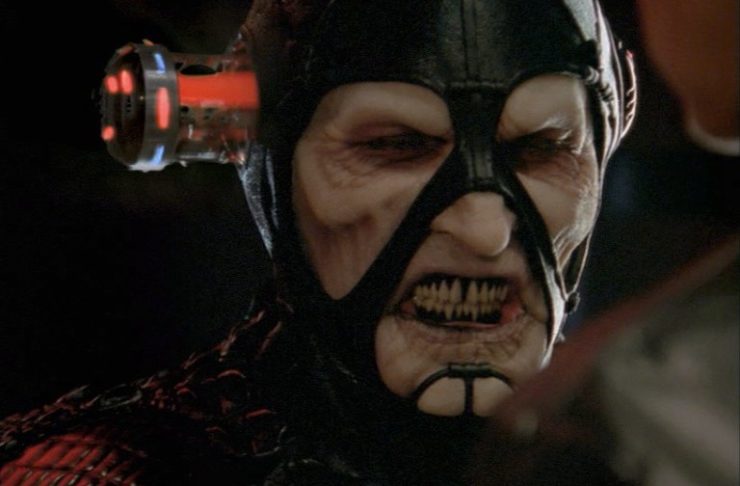
Let’s be honest, I could have picked anyone in Farscape for this list because most of the characters on this show deal with some form of pain or another. Pilot and Scorpius top my list for two very different reasons, though. In Pilot’s case, we go through an entire season of the show before we find out that Pilot’s bond to the Leviathan ship Moya was not allowed to occur naturally; he was grafted into her systems after Moya’s previous Pilot was murdered, which meant that Pilot was forced to endure constant pain as a result of his forced connection. The crew eventually rebond him to the ship so he can continue without pain, but he goes years without mentioning his discomfort to anyone out of guilt and shame.
Then there’s Scorpius, whose pain comes from the fact that he is the result of forced interspecies breeding between a Scarran and Sebacean. Since one of these species thrives on heat and the other slips into a coma when it gets too warm, Scorpius cannot regulate his own body temperature. This problem is used to torture him as a child, but he manages to create a system by which cooling rods can be inserted into his brain to maintain his internal temperature. Still, the system requires that he change these cooling rods frequently in order to survive. It’s not a pretty picture, but Scorpius keeps his composure regardless—he’s a beast when it comes to control under pressure, and I adore him for it.
Avatar Korra—The Legend of Korra
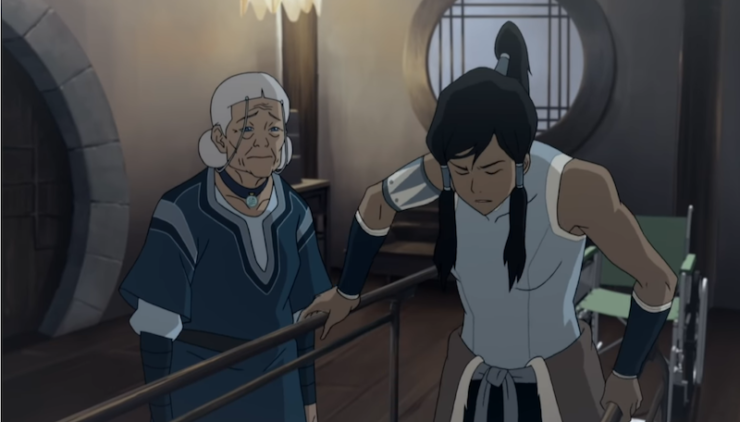
So many things come so easily to Korra when she’s young, but the universe seems intent on ridding her of the ease very quickly. First, she loses the ability to bend water, fire, and earth thanks to Amon, and requires the aid of Avatar Aang’s spirit to regain it. Then Korra is kidnapped by Red Lotus member Zaheer, and poisoned with mercury. She uses a wheelchair for a time, and though she eventually regains the ability to walk through vigorous physical therapy, she can no longer enter the Avatar State. Korra also suffers from PSTD following her confrontation with Zaheer, and has residual mercury in her body that cannot be removed due to her own subconscious pushback.
With the help of Toph Beifong, Korra eventually releases her fears and rids herself of the remaining poison, regaining all of her abilities. But her rehabilitation is arduous, frightening, and painful, which is rare to see in stories about big heroes who do great deeds. Anyone who has gone through rehab for physical, mental, or emotional trauma can find truth in Korra’s story, and for that, I’ll never hear a word against her.
John Silver—Black Sails
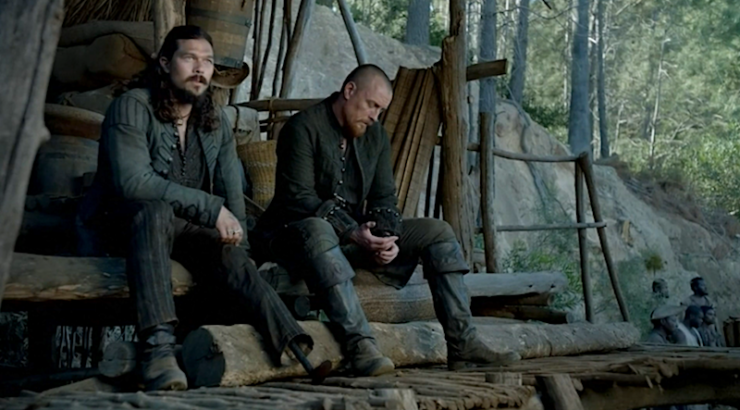
Look, it’s not exactly SFF, but it’s a prequel to Treasure Island, so I say it counts. The point is, John Silver doesn’t like Captain Flint’s crusade, he doesn’t like pirates or cooking or vendettas, he doesn’t even like the ocean. But he stays because the gold Flint has a mind to capture could give him true freedom. Then he ends up catching too many feelings for the people around him, which leads to a noble deed, which leads to having his leg bashed to pieces with a mallet and the amputation of said leg to save his life.
Keeping that leg from getting infected before the invention of penicillin is not an easy task, and Silver ends up trading out a painful and inflexible prosthetic for his more famous crutch. Thing is, if you’ve ever walked with a crutch, you know how quickly that can throw your spine out of alignment and lead to a torrent of back and hip issues. And John Silver is dealing with that on the decks of ships, where you’re tossed back and forth perpetually. The point being, there is no way he’s not in some amount of pain, consistently. And my brain will not allow me to ignore it.
Remus Lupin—The Harry Potter Series by J.K. Rowling
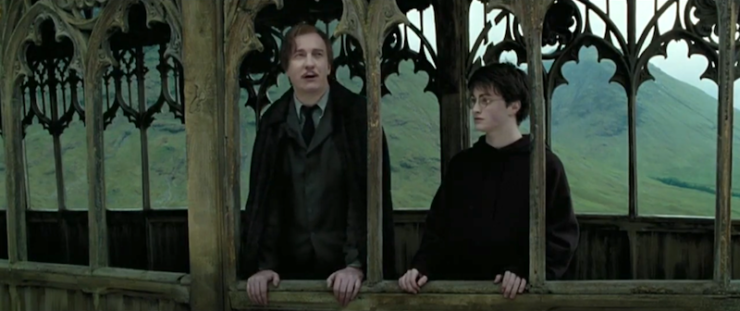
J.K. Rowling went out of her way to say that Remus Lupin’s lycanthropy was a metaphor for AIDS and diseases like it, which is a weird thing to insist in regard to your book series where not a single character ever mentions being queer on the page. But that’s neither here nor there. Author commentary notwithstanding, Lupin’s little werewolf problem is an easy analog for any number of chronic illnesses—especially ones that come with “flares” that reassert the disease or condition over and over.
I happen to have one of those, and was reading Harry Potter at a point in life when my condition was rearing its head. Lupin’s monthly rewounding, as his body broke into a werewolf shape and then rebroke back into a human one… it burrowed into my brain like a small, soft rodent in need of a home and never let me go. He will always be my favorite character in the series, and that is greatest measure of why: Remus Lupin, shunned and deemed unemployable and always in some form of pain or another, yet it never stopped him from being kind. From educating others. From trying to give as much as he could when he had virtually nothing. Just give him a cottage near a sleepy town with a decent chocolate shop and leave him be.
This is honestly just a preliminary head count from the League of Pain Friends that I have lurking about in my brain. Who are yours?
Emmet Asher-Perrin needs a League of Pain Friends patch for a denim jacket. You can bug him on Twitter, and read more of her work here and elsewhere.










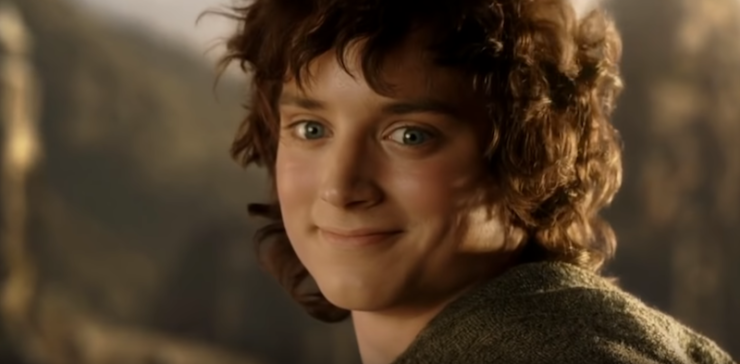
League of Emotional Pain friends–Valancy in Lucy Maud Montgomery’s The Blue Castle and Sidda in The Divine Secrets of the Ya-Ya Sisterhood.
Rand al’Thor.
“You’re destined to save the world or destroy it. Not sure yet. Also if you seem to be turning evil I’ll probably kill you. Sleep well!”
“Oh you’re also going to go mad due to having powers you can’t control. Try to keep sane if you can, ok? And no, I can’t help you learn to control those powers because you’re a fish and I’m a bird or something.”
“ALSO 13 of the most dangerous people ever known, who have vast knowledge of the power you can’t control, are trying to kill and/or turn you to evil.”
Ishamael: “Imma stab you with a wound that can’t be healed.”
Fain: “Ditto. Right in the same spot.”
“By the way, enjoy having the voice of a crazy man in your head.”
“Here, we’ll give you an army of highly trained warriors that are decended from your ancestors. BTW to gain this army you need to reveal a terrible truth to them that will shame them to their core. Enjoy!”
“Here let me burn off your hand and partially blind you.”
“Here let me put you in a device that allows me to control every move you make and inflict any amount of pain. And use that device to force you to slowly choke the life out of a loved one.”
“Good news! You accessed a new power to escape aforementioned horrible device! Oh by the way it is a direct connection to the force of all evil, and it is highly addictive.”
etc.
Wolverine is not hurting. He has a healing factor! Sure, it pains him to pop out his claws, but the wounds instantly heal. It’s a very, very brief moment of pain.
Every dwarf is a bastard in their father’s eyes. Tyrion Lannister
In the comic when Magneto ripped the adamantium off Wolverine’s bones it was revealed the claws were part of him all along, and that every time he extended them it ripped through his flesh; previously it had been thought they were implanted and had channels to extend them. And without the adamantium, his healing factor was amplified as it had previously been constantly working to repair the damage from the metal, and he turned a bit more feral as his enhanced senses were also boosted.
I really liked what they did with him in Logan, with age finally taking its toll on him after so many years.
@3/Austin, just because Wolverine healed nearly instantly, doesn’t mean it didn’t hurt. He was in constant pain, over his entire body. Having lived with lower back & hip pain for around 30 years, I can totally understand why that made him a tad grumpy.
“If Glokta had been given the opportunity to torture any one man, any one at all, he would surely have chosen the inventor of steps.“
@2 Ishamael: “Imma stab you with a wound that can’t be healed.”
Fain: “Ditto. Right in the same spot.”
Remember when Rand got warder-bonded? For both Alanna and the trio, they immediately started weeping when they realized just how much pain he was enduring 24/7.
Miles Vorkosigan?
Though I’m having trouble sorting out characters who are hurting from characters who constantly have bad things happen to them.
ETA: @8 Which reminds me of Drax from Guardians of the Galaxy.
Which further reminds me of the Ninth Doctor. Now I’m sad.
I think Wolverine’s claws and the physical pain they cause him are meant to be symbolic of the residual hurt of being an experiment, not remembering who he is, being a friendless mutant outcast, etc. You know, the deep pain booze can’t wash away.
Might not be physical pain, but my first thought was poor Murderbot. “Oh, sure, you’re kinda human but not human enough, and you can never ever forget that even once.”
@6 – Wolverine doesn’t have hip or back pain. His healing factor, even reduced as it is with adamantium in his body, instantly heals any hurt or injury. Wolverine only experiences momentarily pain at the first instance of injury. He does not have any lasting pain.
Now, in Logan, Wolverine’s healing factor can no longer keep up with the metal poisoning. In that movie, he is definitely in constant pain.
I love both Frodo and Lupin. I feel like Snape is arguably one as well (but I absolutely loved the article you wrote years ago on why he doesn’t deserve your pity) but he also is a nasty piece of work and I feel like I can feel both of those things about him.
However, for me, the number one choice as soon as I saw the title was Luke Skywalker, whom I just kind of want to hug forever, except now he’s dead and I’ll never forgive the sequels for all of that :( :( :(. And to a similar extent Leia, who had to live through the government she sacrficed everything for collapsing, her husband abandoning her, her brother abandoning her, her son betraying her for a bunch of fascists responsible for the former, and then killing said husband and brother, and STILL has to be the one keeping the ‘spark’ alive.
@5: It’s not age that takes Logan down in Logan. Adamantium is the strongest metal (fictiously) known, but it’s also poisonous.
Cordelia Vorkosigan. We’re both mothers of preemies. Her psychological wounds are as deep as Miles’s physical ones.
Morwenna Markova from Among Others.
Not just Miles, who’s shown gritting his teeth and acting unconcerned at age 5 when he breaks his arm, but also his clone brother Mark who was forcibly turned into a same-size twin although he didn’t have the damage in utero that Miles did — he could have been physically “normal”. Not to mention the psychological pain inflicted on him!
Pretty much ALL of the characters in The Fifth Season, but most of all Alabaster. That man’s suffering broke my heart ten times over. ;~;
great list, l love most of these characters
When I was a teenager, I read Steven R. Donaldson’s trilogy, the First Chronicles of Thomas Covenant. The main protagonist was a human named Thomas Covenant, and he had a friend who was a giant named Foamfollower. In the real world, Covenant had leprosy and had lost a couple of fingers off of his right hand. When get gets transported to The Land he finds that while his fingers are still missing, he is healthy in every other way. The problem is that believing you are healthy can kill someone with leprosy. They could stop taking care of himself. He thinks he is dreaming or going insane. This causes constant turmoil for him throughout the series. The people of the land dub him the “Unbeliever”, and it is because of this unbelief that leads him to do bad things and suffer terribly for them.
His friend, Foamfollower, has a scene in the last book that, while I don’t want to spoil it for anyone, caused me great anxiety. Let’s just say it gave me a healthy respect for lava for the rest of my life.
Both characters go through some pretty rough times, and I felt such empathy for them both. If you haven’t read the series, I highly recommend it.
Thanks for this article, Emily. As someone who has struggled with a chronic illness for the past dozen years, I understand.
Leonard Nimoy says in his autobiography that he got WAY more fan mail after “The Naked Time” than before it. Because no one can resist a sobbing half-Vulcan. :-) “The Naked Time” revealed what was at the core of every character, and Spock was unique in revealing that what was at HIS core was pain.
Fifty years later, the guy still rips my heart out.
Shallan Davar, or any of the budding radiants in the Stormlight Archives. Half their stories break my heart, and other half make me cheer. Oh, and then the most recent book and Elhokar….
@21 My poor Kaladin.
Kaladin from The Way of King’s! <3
Don’t forget Cazaril from The Curse of Chalion. I’d say Bujold has a knack for writing the chronically pained, but she’s got a knack for writing pretty much everything.
• Bijou the Artificer in Bone and Jewel Creatures by Elizabeth Bear. Bijou hobbles around, saving the city from a plague and domineering necromancer despite her arthritis and advanced age.
• Miles Vorkosigan. Also Simon Illyan in Memory, because brain trouble is my worst nightmare.
• Cassandra Devlin in the Touchstone Trilogy. She’s young & healthy, but first she’s starving on an alien planet, and then she’s severely injured repeatedly – nanomachines are great healers, but that doesn’t help with rebuilding her physical stamina after every injury. I reread the Touchstone books during my own bad flares, for this and, maybe it’s evil of me, but she gets such nasty injuries that I don’t feel I have the worst of things. –Plus nanomachines that can heal most illnesses (gotta dream a little).
• Tarma, in the books after Oathbound, when she has increasing arthritis and pain from all her scar tissue, etc. In the Vows and Honor series by Mercedes Lackey
Eleven in ‘Stranger Things’.
Jean Val-Jean in ‘Les Miserables’
Let’s not forget the Elantrians in Elantris. When they receive a wound, the pain never fades. That sharp pain from stubbing your toe? You’re going to feel it for the rest of your life. They don’t die, they just fade into a pain-induced catatonic state after receiving enough wounds. And yet Raoden rises above and creates a society out of anarchy.
Many of the characters I thought of have been mentioned, but I would also nominate pretty much the entire cast of Babylon 5, all of whom had some sort of cross to bear, or emotional burden they had to deal with.
19. Trampiere stole the very first character I thought of as soon as I read the article. Thomas Covenant was pain and guilt and regret personified. These books are where I learned the word Catharsis when I was a teenager and wished that there was a “caamora” for people today.
Let’s not forget Melkor, aka Morgoth, whose wounds at the hands of Fingolfin could never heal. He’s in agony in the outer darkness to this day.
@7 Exactly what I came here to say. Sand dan Glokta was who the article’s title immediately brought to mind. Though he may not have the… healthiest way of dealing with his pain.
FitzChivalry in Robin Hobb’s Farseer Trilogy. That poor guy got put thru the wringer, both physically and emotionally, over and over again. I’ve actually been reluctant to read past the original trilogy because of how much and how often I cringed reading the first set.
@28, with Babylon 5, let’s step across the 4th wall for a moment and acknowledge Michael O’Hare.
I love korra. I got into the Avatar myth through the Legent of Korra. And let’s not forget Dana Scully. She’s been through “alien” abduction, her sister got murdered, she learns that she can’t have a baby because of the experiments they’ve done to her during her abduction, she fought cancer, she has a chip in her neck, she found out she has a daughter and later sees her dying, she is transformed into a hybrid, she has a son who she has to give up for adoption because everyone is after him and I’m forgetting a lot and I’m not including the revival. And she’s been through all these with strength and grace, without loosing her kindness and faith in justice and she kept doing the right thing. She’s definatelly one of the best female characters in fiction.
Fitzchivalry, yes, but for me it’s the Fool whose pain is greatest. Interesting article, it had never occurred to me that I might be identifying with sufferers of chronic pain, despite years of it myself. My favourite pain-racked hero is Francis Crawford from Dorothy Dunnett’s Lymond Chronicles.
Auri of Kingkiller chronicles by Patrick Rothfuss.
@2 @8 Definitely Rand Al’Thor, the Dragon Reborn. Unending pain of every kind.
Also Logain, to a lesser but still dramatic degree.
I agree with Lupin and Frodo, too.
Elric of Melnibone. A seriously depressed albino with a sword that drinks souls. The dude never smiled. Ever. And also Malus Darkblade. A dark Elf possed by a demon made to do some awful things all while knowing exactly what he was doing. Still, Rand takes em all. Even Frodo, the little Hero.
I like this list, and feel the same way. A character without pain is boring and paper thin. My contribution to this list would be Buffy The Vampire Slayer, who deals with all kinds of pain, both physical and mental. Thus her triumphs — when they DO happen — are far more intense. “The Body” (Season 5, Episode 16) is one of the most painful experiences I’ve ever watched a character in any genre endure.
Also, Thomas Covenant, of Steven R. Donaldson’s six-book “The Chronicles of Thomas Covenant” series, is a full-fledged leper whose entire family abandons him in our world as he loses his mind while falling into another, possibly delusional world known the Land. So, yeah. Also painful.
If you like those kind of characters, i recomend you to read the Vorkosigan saga. Miles is a perfect example of overcoming physical difficulties and the effects they have on personality.
I was thinking further about this, and think Vash the Stampede, from Trigun, should really be added here. That character’s constant emotional torment paired with his frequently child-like optimism and sense of wonder always appealed to me.
@33: Oh God, yes. I can’t even imagine how difficult shooting “And the Sky Full of Stars” must have been for him.
I think one who deserves mention in this list, Raistlin the dark mage from Weis and Hickman’s Dragonlance Chronicles. That wizard was always in pain, both physically and mentally. Always having to take his medicine and always trying to do the right thing while being pulled down a dark path. He was one tortured dude!!!
Miles Vorkosigan, in the 12+ novel series by Lois Bujold … born a dwarf with a soft skeleton on a macho military oriented planet … fabulous series, fabulous powerful characters, a continuing series with an interstellar platform.